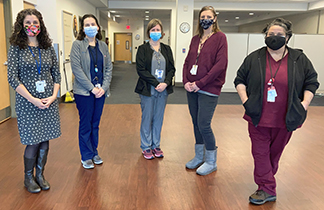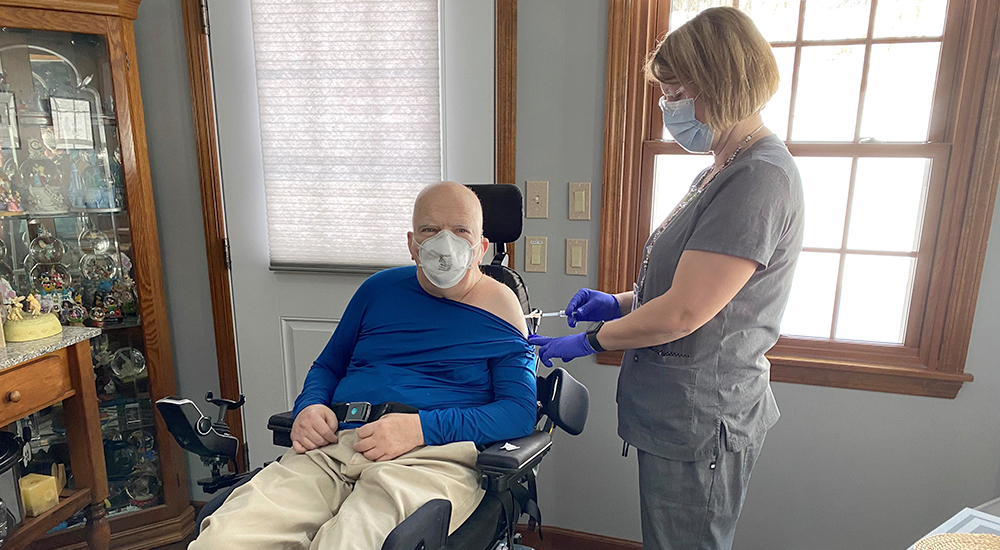Veterans enrolled in VA Pittsburgh Healthcare System’s Home-Based Primary Care (HBPC) program are receiving COVID-19 vaccines in their homes.
Air Force Veteran Bill Schenker received the Pfizer COVID-19 vaccine on Jan. 26 in his home from VA nurse Stacy Faulkner (pictured above). His wife and caregiver, Lois, also received her first dose of the vaccine. She was eligible as a caregiver in VA’s Program of Comprehensive Assistance for Family Caregivers (PCAFC).
Schenker served in the Air Force from 1969 to 1972 as a C-130 aircraft mechanic. He was stationed all over the world, including Langley Air Force Base in the U.S. and overseas in Thailand, Vietnam, Germany and England.
After he was discharged from the military, he attended Duquesne University in Pittsburgh and became a full-time certified public accountant upon graduating.
Schenker and his wife have lived in Pittsburgh their entire non-service lives. Wheelchair bound, he has been receiving care at VA for almost 50 years and is a former president of the Paralyzed Veterans of America Keystone Chapter.
“VA has been exceptional,” said Lois Schenker. “We have no complaints about anybody who’s ever been assigned to us.”
Safety and in-home COVID-19 vaccines
HBPC administers the Pfizer-BioNTech COVID-19 vaccine. It must be kept in ultra-cold storage until it is prepped for use. Once prepped, it can be stored at room temperature for six hours before it must be discarded. Pharmacy staff prep the required number of doses each day for HBPC’s nurses.
The nurses travel to eligible Veterans’ homes to administer the vaccine over a four-hour period. Any leftover doses are returned to VA Pittsburgh’s H. John Heinz III campus to be administered to Veterans who have appointments to receive the vaccine.
Dr. Heather McQuillan, VA Pittsburgh’s HBPC program medical director, oversees the entire process, to include staying in contact with the nurses as they visit each Veteran.
“Mr. Schenker has been my patient since 2011 and over the years,” McQuillan said. “I have been in awe of his positive outlook despite his medical issues and his wife’s dedication to his care. When I learned that we were getting the Pfizer vaccine, my immediate thought was to find a way to bring it to both of them in the home.”
The focus of the team
Getting the vaccine to frail, homebound Veterans as quickly as possible is the focus of VA Pittsburgh’s HBPC team, according to Nurse Manager Kari Zana and Associate Chief of Staff for Geriatrics Dr. Steven Handler.
“We believe this approach is innovative and an important service for Veterans,” said Handler.
HBPC nurses follow COVID-19 safety protocols similar to those observed on VA Pittsburgh’s medical campuses. They call ahead of time to screen household members for COVID-19 symptoms, wear face coverings, wash their hands frequently and don gloves during visits.
HBPC visited homes to administer the first 12 doses of COVID-19 vaccines Jan. 19. By the end of January, over 100 Veterans and at least six eligible caregivers in the PCAFC program had received their first dose of the two-dose vaccine in their homes.
“I cried when I heard I was going to get the vaccine”
Lois Schenker applied last October for VA’s PCAFC caregiver program and was approved shortly thereafter. Around mid-January she found out she, too, was eligible for the COVID-19 vaccine.
“I cried when I heard I was going to get the vaccine because I was so excited,” she said. “I just can’t go far away from him and stand in a line somewhere because I don’t drive in snow or in the dark. He’s totally 100% dependent on me for everything, so HBPC is a godsend.”
One of the couple’s three children lives about a mile away. Being so near, the son helps with grocery shopping, using curbside pickup and minimizing any contact with other people.
“Our son here has our only grandchildren. They’re very, very careful,” said Lois Schenker. “We would like to see our other two kids who live in Florida and Georgia. We haven’t seen them in a year now, only on Facetime.”
The family is very close, normally visiting each other multiple times a year.
“Our lives have really changed because of COVID-19,” said Lois Schenker.
Daughter is trauma surgeon
Even though the couple’s other two children had COVID-19, their only daughter, a trauma surgeon in Georgia, received the vaccine.

VA Pittsburgh Healthcare System’s Home-Based Primary Care staff include its director, Dr. Heather McQuillan, left, and registered nurses Ann Watson, Stacy Faulkner, Lindsay Polley and Jennifer Goldsmith.
“She’s planning to come home after our second shot,” said Lois Schenker. “It’s wonderful. It hasn’t been a hassle being here at home. I’m kept busy, but I do miss them a lot.”
The Schenkers said they didn’t experience serious adverse reactions to the vaccine.
“I would encourage people to get the vaccine,” said Lois Schenker. “There’s less chance of getting COVID if everybody gets the vaccine.”
Home Based Primary Care at VA Pittsburgh
Schenker uses a VA-provided iPad to receive most of his health care virtually during the pandemic. HBPC nurses have visited his home only a few times, including to administer vaccines such as the one for COVID-19.
Zana said the goal is to provide most Veterans their health care via VA Video Connect and other forms of telemedicine so they don’t have to leave their homes or invite people into their homes.
HBPC serves Veterans who need in-home team support for diseases and illnesses that affect their health and daily activities. At VA Pittsburgh, HBPC’s interdisciplinary team includes nurses, a social worker, a pharmacist, physical and occupational rehabilitation therapists, a psychologist, a dietitian, a certified registered nurse practitioner and geriatricians.
Qualifications
To participate, Veterans must live in a home appropriate for care that is located within 25 miles of the University Drive campus and be willing to give up their outside primary care provider.
The ONLY non-Veterans who are eligible to receive a COVID-19 vaccine from VA Pittsburgh Healthcare System are primary and secondary family caregivers who are registered in VA’s Program of Comprehensive Assistance for Family Caregivers (PCAFC).
Currently, VA Pittsburgh only has approximately 60 PCAFC caregivers enrolled in the program. As a result, we are contacting them directly.
Learn about eligibility for this program and how to apply. The application process takes a minimum of 90 days and includes clinical eligibility requirements.
You can also learn more about VA’s HBPC program by visiting Home Based Primary Care.
Hope Nelson is a public affairs specialist for the VA Pittsburgh Healthcare System.
Topics in this story
More Stories
Veteran Byron Potier weighed almost 300 pounds and was tired and lethargic. He was the perfect candidate for gastric sleeve surgery.
How much do you know about VA care, benefits and services? Don’t miss out on what you've earned—check out the "2025 VA Federal Benefits Guide for Veterans, Dependents, Survivors, and Caregivers" handbook to learn more.
Feeling stressed? Your breath can help you relax and focus. Take 3 minutes to reset and prioritize your well being for this week's #LiveWholeHealth practice.







because of my emphysema I can not wear a mask so I have been unable to get an appointment all I have been able to get is a letter from my doctor stating I cant wear a mask but was told you will not get in without one and this doesn’t help me be protected from virus while trying to get vaccinated.
Y’all need to stop taking the vaccines you’re stupid if you think that’s going to help you all that’s going to do is kill a bunch of people and the VA used to be a damn shame giving her babies vaccines for something you have a 98.5% chance of survival
[Editor: Please stop sharing this false, deadly information. America has now lost more than 500,000 Americans. Many millions more have been hospitalized or will suffer from permanent longterm effects, including damage to the lungs, heart and brain. More resources and information, here: https://covid.cdc.gov/covid-data-tracker/#datatracker-home ]